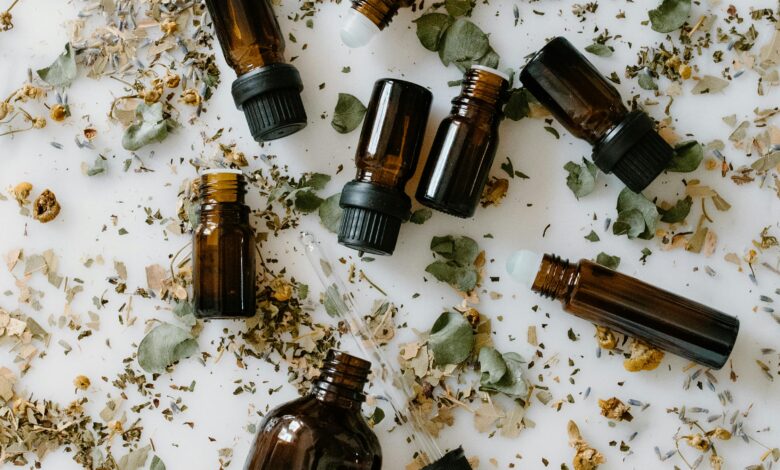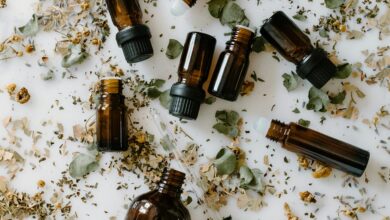How to Use Essential Oils for Health and Wellness

Essential oils have been used for centuries in various cultures for their therapeutic properties. Derived from plants through processes like distillation or cold pressing, these concentrated plant extracts are prized for their aromatic and health-promoting qualities. Whether you’re looking to reduce stress, improve sleep, boost immunity, or alleviate pain, essential oils can be a natural and effective addition to your wellness routine. However, using them safely and effectively is key to reaping their benefits.
In this article, we’ll explore the most common ways to use essential oils, their potential health benefits, and important safety guidelines to keep in mind.
1. Understanding Essential Oils
Before diving into how to use essential oils, it’s important to understand what they are and how they work:
- What Are Essential Oils?
Essential oils are highly concentrated compounds extracted from flowers, leaves, bark, roots, or seeds of plants. Each oil has unique properties based on the plant it comes from. - How Do They Work?
Essential oils interact with the body in several ways:- Aromatherapy: Inhaling the scent of essential oils affects the limbic system in the brain, which controls emotions, memory, and stress.
- Topical Application: When applied to the skin (diluted), essential oils can provide localized relief or enter the bloodstream for systemic effects.
- Internal Use: Some oils can be ingested, but this should only be done under professional guidance due to their potency.
2. Common Ways to Use Essential Oils
A. Aromatherapy (Inhalation)
Inhaling essential oils is one of the simplest and safest methods of use. It’s ideal for emotional and mental well-being.
- Diffusers: Add a few drops of essential oil to a diffuser filled with water. The device disperses the oil into the air, creating a calming or energizing atmosphere.
- Popular Oils: Lavender (calming), Peppermint (energizing), Eucalyptus (respiratory support).
- Steam Inhalation: Add 2–3 drops of oil to a bowl of hot water, cover your head with a towel, and inhale deeply. This method is great for clearing sinuses or relieving congestion.
- Direct Inhalation: Place a drop of oil on a tissue or cotton ball and inhale directly. Useful for quick stress relief or focus enhancement.
B. Topical Application
When applied to the skin, essential oils can target specific areas for pain relief, skincare, or relaxation. Always dilute essential oils with a carrier oil (e.g., coconut, jojoba, almond) to prevent irritation.
- Massage: Mix 2–3 drops of essential oil with 1 tablespoon of carrier oil and massage onto sore muscles, joints, or pressure points.
- Popular Oils: Frankincense (anti-aging), Tea Tree (antiseptic), Chamomile (soothing).
- Baths: Add 5–10 drops of oil to a warm bath along with a carrier oil or Epsom salts for a relaxing soak.
- Compresses: Add a few drops of oil to a bowl of warm or cold water, soak a cloth, and apply to affected areas for targeted relief.
C. Internal Use (With Caution)
While some essential oils can be consumed, this method requires extreme caution and should only be done under the guidance of a qualified healthcare provider.
- Capsules or Drops: Certain oils, like peppermint or lemon, are available in supplement form for digestive support or detoxification.
- Cooking: Food-grade essential oils can be added sparingly to recipes for flavor and health benefits (e.g., adding a drop of lavender to tea).
3. Popular Essential Oils and Their Benefits
Here are some commonly used essential oils and their associated health benefits:
| Oil | Benefits |
|---|---|
| Lavender | Promotes relaxation, reduces anxiety, improves sleep quality. |
| Peppermint | Relieves headaches, boosts energy, aids digestion. |
| Tea Tree | Antibacterial, antifungal; great for acne, dandruff, and minor cuts. |
| Eucalyptus | Clears respiratory congestion, supports immune function. |
| Lemon | Detoxifies, uplifts mood, cleanses surfaces naturally. |
| Frankincense | Anti-inflammatory, promotes skin healing, enhances meditation practices. |
| Chamomile | Calms nerves, soothes irritated skin, alleviates menstrual cramps. |
4. Safety Guidelines for Using Essential Oils
While essential oils offer numerous benefits, improper use can lead to adverse reactions. Follow these safety tips:
A. Dilution
- Always dilute essential oils with a carrier oil before applying them to the skin. A general guideline is 1–2 drops of essential oil per teaspoon of carrier oil.
- Avoid undiluted application, especially on sensitive areas like the face or mucous membranes.
B. Patch Test
- Perform a patch test by applying a small amount of diluted oil to a discreet area of skin. Wait 24 hours to check for irritation or allergic reactions.
C. Avoid Sensitive Areas
- Never apply essential oils near the eyes, ears, or open wounds.
D. Consult a Professional
- Pregnant or nursing women, children, and individuals with medical conditions should consult a doctor before using essential oils.
- Certain oils, such as wintergreen or cinnamon, may not be safe for everyone.
E. Storage
- Store essential oils in dark glass bottles away from sunlight and heat.
- Keep them out of reach of children and pets.
F. Quality Matters
- Choose pure, high-quality oils from reputable brands. Look for labels indicating “100% pure” or “therapeutic grade.”
5. Incorporating Essential Oils Into Your Daily Routine
To make the most of essential oils, integrate them into your daily life:
- Morning Boost: Diffuse invigorating oils like citrus or peppermint while getting ready for the day.
- Work Focus: Apply diluted rosemary or lemon oil to your wrists to enhance concentration during work.
- Evening Relaxation: Use lavender or chamomile in a diffuser or bath to wind down before bed.
- Post-Workout Recovery: Massage sore muscles with a blend of eucalyptus and peppermint oils.
6. Potential Risks and Side Effects
While essential oils are generally safe when used correctly, misuse can cause issues such as:
- Skin Irritation: Undiluted oils may irritate or burn the skin.
- Allergic Reactions: Some people may experience allergies to specific oils.
- Photosensitivity: Citrus oils (e.g., bergamot, lemon) can increase sun sensitivity if applied topically.
- Toxicity: Ingesting certain oils without proper guidance can be harmful.
If you experience any adverse effects, discontinue use immediately and seek medical advice.




